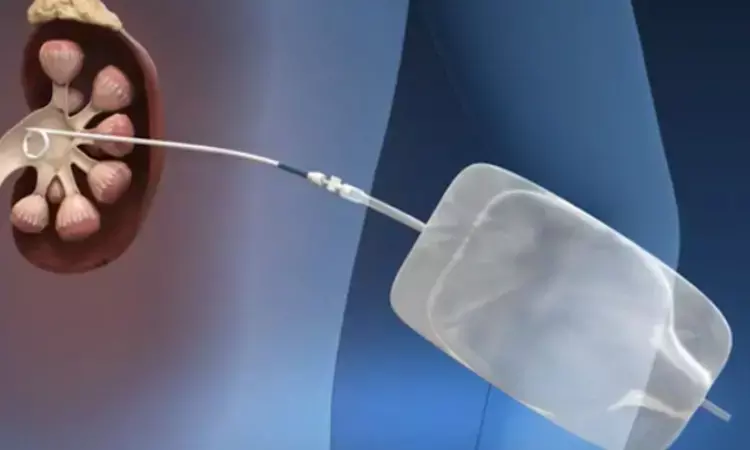- Home
- Medical news & Guidelines
- Anesthesiology
- Cardiology and CTVS
- Critical Care
- Dentistry
- Dermatology
- Diabetes and Endocrinology
- ENT
- Gastroenterology
- Medicine
- Nephrology
- Neurology
- Obstretics-Gynaecology
- Oncology
- Ophthalmology
- Orthopaedics
- Pediatrics-Neonatology
- Psychiatry
- Pulmonology
- Radiology
- Surgery
- Urology
- Laboratory Medicine
- Diet
- Nursing
- Paramedical
- Physiotherapy
- Health news
- Fact Check
- Bone Health Fact Check
- Brain Health Fact Check
- Cancer Related Fact Check
- Child Care Fact Check
- Dental and oral health fact check
- Diabetes and metabolic health fact check
- Diet and Nutrition Fact Check
- Eye and ENT Care Fact Check
- Fitness fact check
- Gut health fact check
- Heart health fact check
- Kidney health fact check
- Medical education fact check
- Men's health fact check
- Respiratory fact check
- Skin and hair care fact check
- Vaccine and Immunization fact check
- Women's health fact check
- AYUSH
- State News
- Andaman and Nicobar Islands
- Andhra Pradesh
- Arunachal Pradesh
- Assam
- Bihar
- Chandigarh
- Chattisgarh
- Dadra and Nagar Haveli
- Daman and Diu
- Delhi
- Goa
- Gujarat
- Haryana
- Himachal Pradesh
- Jammu & Kashmir
- Jharkhand
- Karnataka
- Kerala
- Ladakh
- Lakshadweep
- Madhya Pradesh
- Maharashtra
- Manipur
- Meghalaya
- Mizoram
- Nagaland
- Odisha
- Puducherry
- Punjab
- Rajasthan
- Sikkim
- Tamil Nadu
- Telangana
- Tripura
- Uttar Pradesh
- Uttrakhand
- West Bengal
- Medical Education
- Industry
Total tubeless PCNL game-changer for post-op pain management and efficiency in kidney stone treatment, highlights study

Turkey: Percutaneous nephrolithotomy (PCNL) is a well-established procedure for treating kidney stones, but recent advancements have sparked debate over the best approach. A new study comparing standard PCNL with total tubeless PCNL performed in the supine position offers fresh insights into these techniques.
The study revealed that total tubeless (TT) percutaneous nephrolithotomy in the supine position reduces postoperative pain in selected patients without affecting the complication rates as in prone PCNL. According to the authors, the study was the first to compare TT and standard PCNL in the supine position," the researchers wrote. The findings were published online in Urolithiasis on June 04, 2024.
Both techniques delivered similar complication and stone-free rates, however, TT PCNL boasted shorter fluoroscopy & operation times. Most notably, TT PCNL emerged as a game-changer for postoperative pain management, significantly reducing visual analog scale scores.
The debate over which method provides superior outcomes continues to evolve, with proponents of each technique advocating based on their respective advantages. While standard PCNL remains a cornerstone in kidney stone treatment, total tubeless PCNL in the supine position presents a compelling alternative for selected patients seeking faster recovery and reduced postoperative complications.
Çağdaş Bildirici, Department of Urology, Bitlis State Hospital, Bitlis, Turkey, and colleagues aimed to compare the safety, efficacy, and advantages of the total tubeless percutaneous nephrolithotomy and standard PCNL in the supine position.
In the study carried out at İzmir Tepecik Health Application and Research Center, 87 patients were examined. Forty-three patients who underwent the TT procedure were defined as Group 1, and 44 patients who underwent the standard procedure with a nephrostomy tube were defined as Group 2.
Two techniques were evaluated with outcome parameters and demographic data. Univariate regression analyses were conducted in these data sets for the parameters that predicted the TT procedure.
The study revealed the following findings:
· The demographic data of the groups and all characteristics of the stones were similar.
· When the results were examined, the stone-free rates detected by non-contrast computed tomography (CT) in the postoperative 1st month were similar between the groups.
· Complication rates and secondary intervention rates were similar.
· Operation and fluoroscopy times were shorter in group 1, which were not statistically significant.
· Postoperative hemoglobin decreased, and creatinine values were similar.
· In Group 1, mean postoperative visual analog scale (VAS) scores and the percentage of VAS reporting > 5 points for pain level measurement were lower and statistically significant.
· In the univariate analysis of the factors predicting the TT procedure, no significant results were found in any parameter.
In conclusion, while both standard and total tubeless PCNL techniques have proven efficacy in treating kidney stones, the choice between them hinges on a nuanced understanding of patient factors and desired outcomes. This study marks a step forward in clarifying the comparative benefits of these procedures, paving the way for informed decision-making in clinical practice.
Reference:
Bildirici, Ç., Çetin, T., Yalçın, M.Y. et al. Comparison of standard percutaneous nephrolithotomy and total tubeless percutaneous nephrolithotomy in the supine position. Urolithiasis 52, 82 (2024). https://doi.org/10.1007/s00240-024-01580-5
Dr Kamal Kant Kohli-MBBS, DTCD- a chest specialist with more than 30 years of practice and a flair for writing clinical articles, Dr Kamal Kant Kohli joined Medical Dialogues as a Chief Editor of Medical News. Besides writing articles, as an editor, he proofreads and verifies all the medical content published on Medical Dialogues including those coming from journals, studies,medical conferences,guidelines etc. Email: drkohli@medicaldialogues.in. Contact no. 011-43720751


